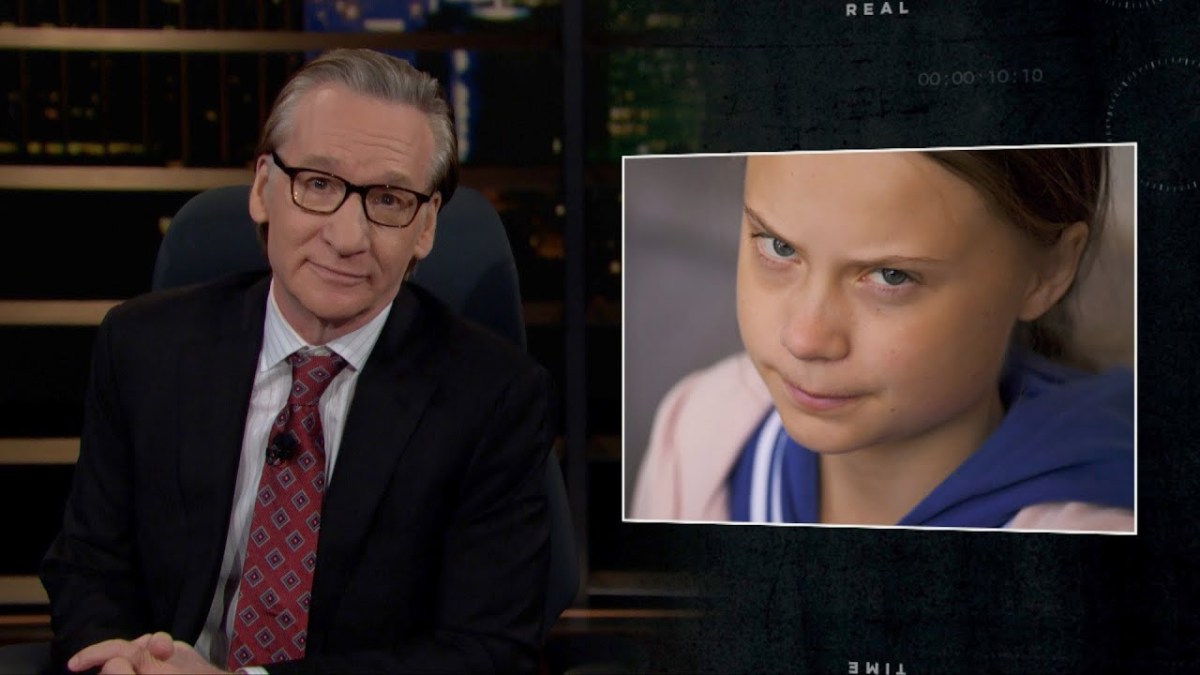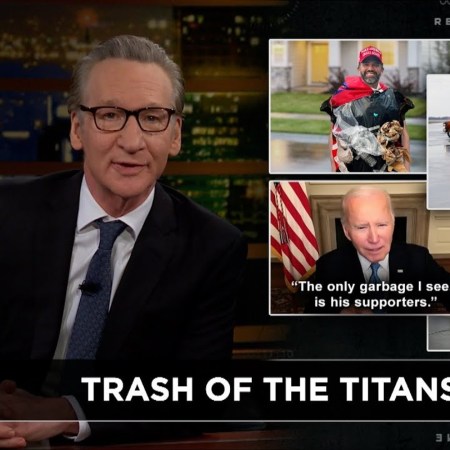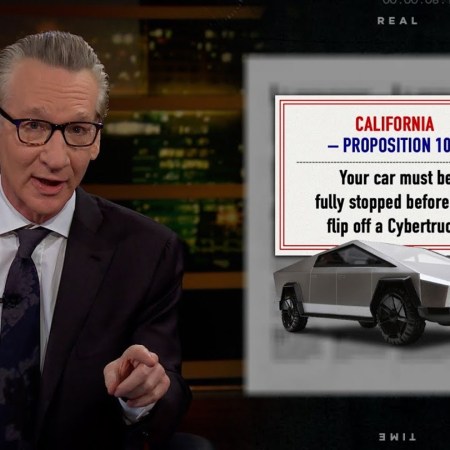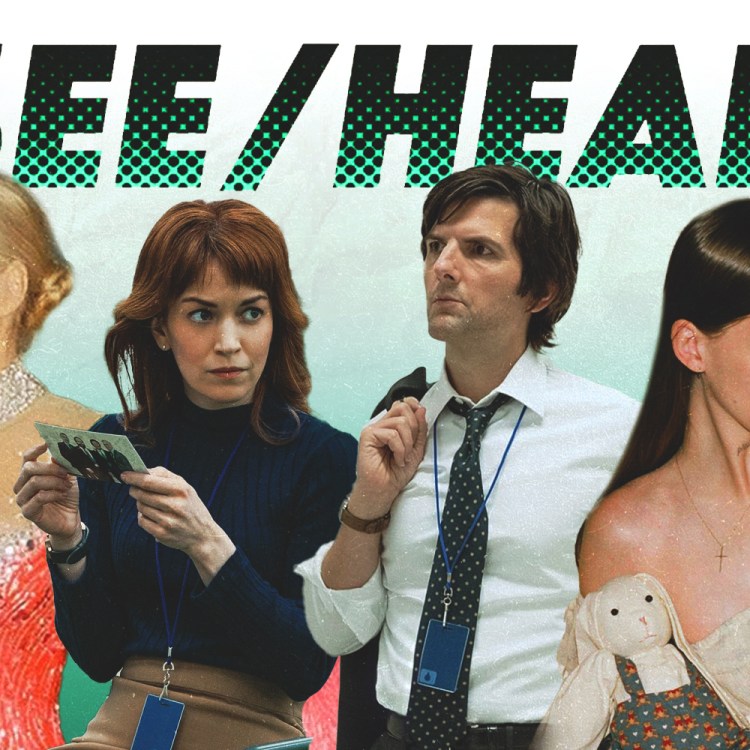Looking for substantive policy talk on your late night television viewing? For the second straight week, one of the guests on an episode of Real Time With Bill Maher was a sitting U.S. Senator — Delaware’s Chris Coons last week, Minnesota’s Amy Klobuchar this week. The episode began with Maher thanking his audience for its optimism. “It was a very strange week,” he said regarding this week’s election — and went on to observe that Virginia governor-elect Glenn Youngkin “sounds like the Scotch you buy at Costco.”
From the election post-mortem, Maher moved on to the recent phenomenon of conservatives embracing the phrase “Let’s go Brandon” and Joe Biden apparently falling asleep while attending the 2021 United Nations Climate Change Conference. “The far left is right,” Maher said. “He’s not woke enough!” As Maher pointed out, though, there are genuine reasons to feel good about Biden’s presidency — from new treatments for COVID-19 to positive economic news. Would his approval rating eventually reflect these?
The last third or so of Maher’s monologue illustrated how bizarre the state of the world currently is. Maher didn’t need much in the way of punchlines here; all he did was recount some recent events. First was QAnon converging on Dealey Plaza; then came the “Small Dong March” in Los Angeles. Sometimes an expression of bemusement and a skewed glance can speak volumes.
Maher’s first guest? Senator Amy Klobuchar, whose book Antitrust: Taking on Monopoly Power from the Gilded Age to the Digital Age was published earlier this year. Maher and Klobuchar began by discussing prescription drug prices, and moved from there to the infrastructure bill. “Why didn’t you sell it in pieces?” Maher asked — and later spoke of the Democrats’ need for a “messaging czar.”
Klobuchar made an impassioned case for different pieces of the overall bill, emphasizing the importance of childcare and the hazards facing people for whom essential prescription drugs have become significantly more expensive. And when the debate over messaging continued, Klobuchar held fast. “You’ve got to put people first,” she said, “and somehow that’s gotten lost in all the archaic Senate rules and the discussion of who’s up, who’s down.”
Klobuchar also alluded to some of the work she’s been doing addressing large tech companies, which has been bipartisan in scope. And while she and Maher cordially disagreed on some matters relating to parenting and social media, they concurred when it came to the dangers of monopolies. “If you can get six Republicans to vote with you on this issue, you’re good,” Maher said.
Joining Maher for the panel were Michael Eric Dyson, author of Entertaining Race: Performing Blackness in America, and Glenn Loury, economist and host of The Glenn Show. Maher’s first question had to do with this week’s election results, and what Democrats could learn from them. Loury’s take on things echoed Joe Manchin’s recent comments to the effect that this is a center-right country. Dyson’s argument was that it was “more of a mixed message,” including the idea that running an anti-Trump campaign might not suffice for Democrats going forward.
The election results in Virginia quickly came to the forefront of the debate, and with it the role that critical race theory did or did not play in said election. Dyson argued that textbooks today “don’t recognize the full complement of identities, conflicts and tensions that Black people participated in, along with other Americans, to make this nation.”
Occasionally, Dyson and Loury seemed to be talking past each other — Loury addressed questions of ideological differences and moving beyond racial characterizations, while Dyson cited instances of racism in the distant past and the present day. All three discussed the current state of college campuses, something that let both Dyson and Loury reference their own experiences as professors and with contemporary campus life.
“If you’re a majority student, you don’t understand the degree to which your ‘normal experience’ may be alienating to somebody who doesn’t feel like they belong there,” Dyson said.
In the second half of the segment, discussion turned to the current state of policing, and efforts to reform or defund police departments. For a large portion of the discussion, Loury and Dyson debated one another, with Loury making a case for deracializing police abuses and Dyson offering a more critical perspective on the subject.
New Rules found Maher riffing on Pete Davidson, home printers and the time Donald Trump touched a giant glowing orb. From there, he segued back to the Glasgow summit, hailing Greta Thunberg as “the conscience of her generation.” That had a double meaning, though — Maher noted that Thunberg has 13 million Instagram followers, while Kylie Jenner has 279 million. And Jenner wasn’t the only celebrity fond of excess atop excess that Maher critiqued in the segment.
“The cognitive dissonance between planet-destroying conspicuous consumption and planet-saving rhetoric is breathtaking,” Maher said — and then went on to get a few digs in at the environmental costs of Bitcoin mining. Avocado toast references aside, this was one of Maher’s better critiques of younger generations — in part because he was as critical of his own. “I wish your generation was better than mine,” he said as the segment drew to a close. “But the said truth is, we’re completely the same.” It was a more self-aware moment than usual — and it was all the better for it.
Thanks for reading InsideHook. Sign up for our daily newsletter and be in the know.


















